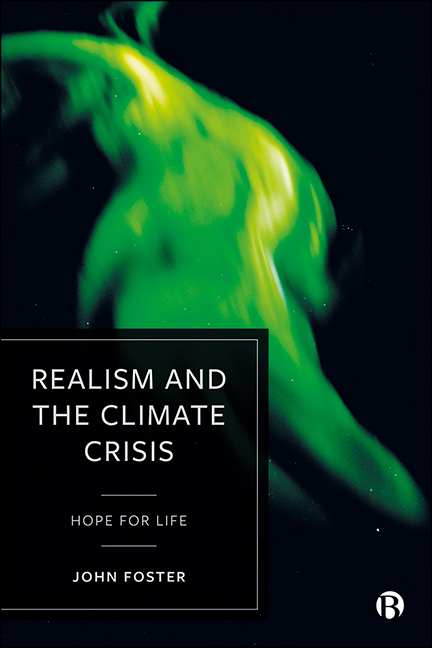Book contents
- Frontmatter
- Dedication
- Contents
- A Note on Notes
- Acknowledgements
- Introduction: Hope, Realism and the Climate Crisis
- 1 The Demands of Realism
- 2 Transformation?
- 3 Creating Possibility
- 4 Responsibility Beyond Morality
- 5 The Bounds of Utopia
- 6 Climate Crisis as Tragedy
- 7 On the Way to Revolution
- 8 The New Revolutionary Dynamic
- 9 The Vanguard of Hope
- Notes
- References
- Index
Introduction: Hope, Realism and the Climate Crisis
Published online by Cambridge University Press: 15 September 2022
- Frontmatter
- Dedication
- Contents
- A Note on Notes
- Acknowledgements
- Introduction: Hope, Realism and the Climate Crisis
- 1 The Demands of Realism
- 2 Transformation?
- 3 Creating Possibility
- 4 Responsibility Beyond Morality
- 5 The Bounds of Utopia
- 6 Climate Crisis as Tragedy
- 7 On the Way to Revolution
- 8 The New Revolutionary Dynamic
- 9 The Vanguard of Hope
- Notes
- References
- Index
Summary
to hope till Hope creates From its own wreck the thing it contemplates
Shelley, Prometheus UnboundThe possibility of hope is now the central question of our time. That is because it is crucial to the climate crisis, which is our time's overwhelmingly urgent challenge.
Much else is pressing: poverty, hunger, war and threats of war, unravelling international institutions, clashing religious fundamentalisms, cyber-security, the dark web, deep uncertainties around sexuality and identity … the list goes on. This is altogether the most existentially exacting juncture in human history. But the climate crisis is now absolutely primary. On how we respond to that crisis depends, it is increasingly apparent, the future of our existence itself. There can no longer be any serious doubt that the present trajectory of human-induced global heating, unaddressed or even just inadequately addressed, could within the present century take the Earth's atmosphere to temperatures at which civilization certainly, and maybe human life, could not survive. That claim is so far from being irresponsibly alarmist that it expresses the current sober consensus among informed scientists. It would be excessive to say that in such a context, nothing else matters. But the basic preconditions for anything else to go on mattering all that much for all that long are now at risk. When your house is on fire, first things first is a maxim of mere common sense.
With a house on fire, however, acting hopefully on that maxim is likely to be a fairly simple matter. You will hope for some swiftly available means of putting the fire out, and often this hope will be a perfectly realistic one to entertain in your circumstances, and will be duly answered. With the climate crisis, however, things are a lot less straightforward.
Grounds for hope?
In the first place, what we must hope for seems to escape ever further beyond our reach.
- Type
- Chapter
- Information
- Realism and the Climate CrisisHope for Life, pp. 1 - 13Publisher: Bristol University PressPrint publication year: 2022



